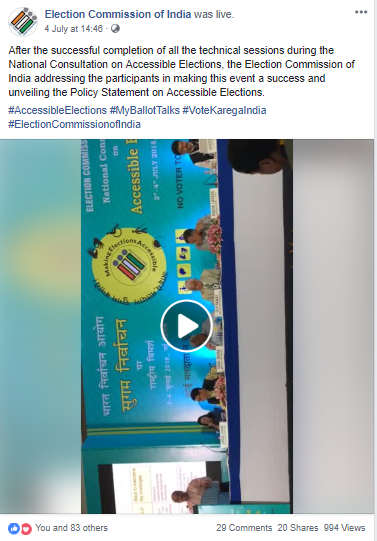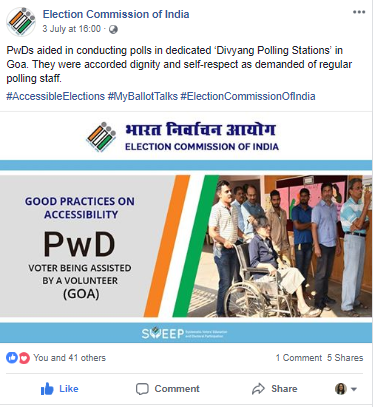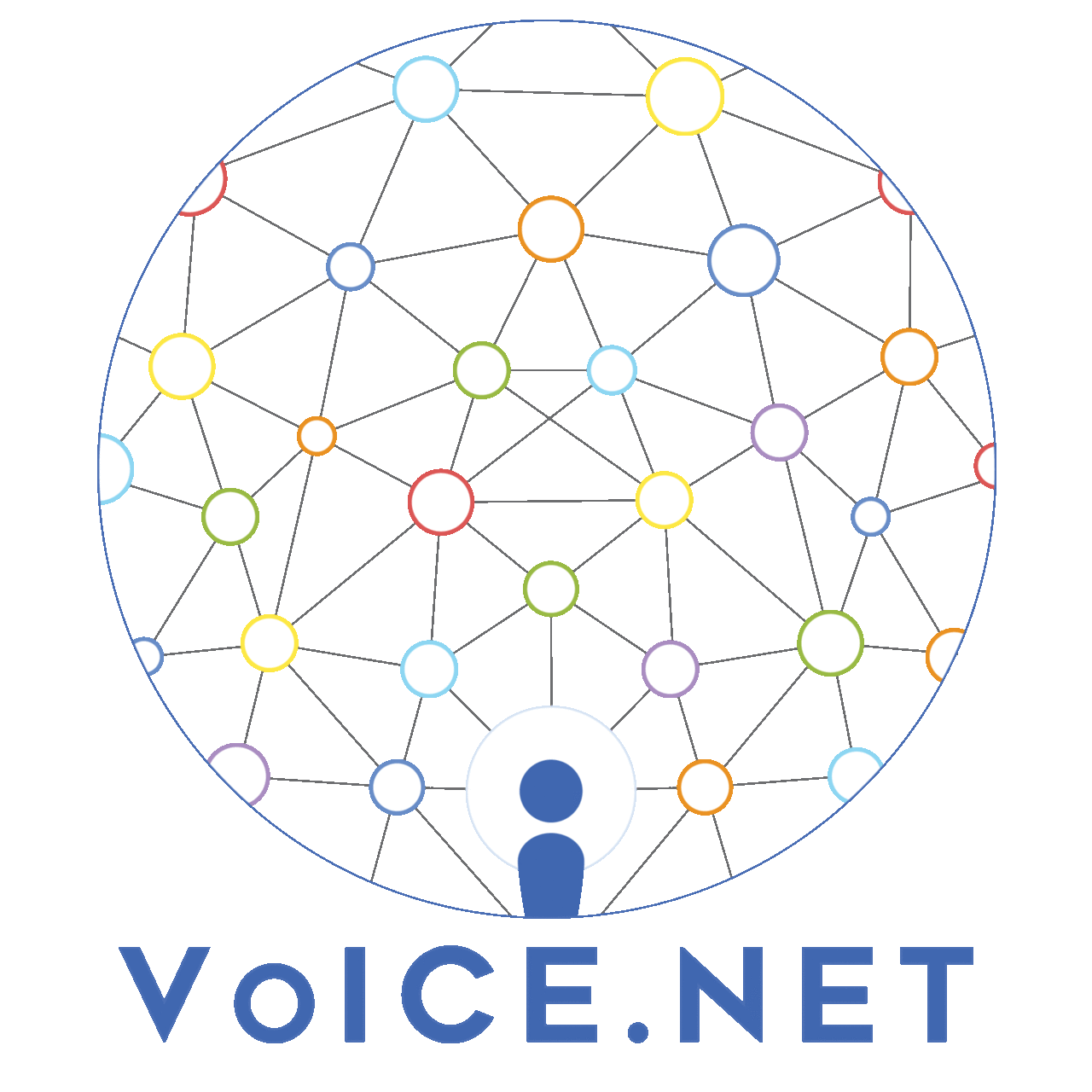
Global Knowledge Network On Voter Education - learning from each other
The Concept
As stated in the Constitution, the principle of Universal Adult Suffrage forms the essence upon which stands the electoral system of India. Drawing from this fundamental aspect, the Election Commission of India is committed to the spirit of 'No voter to be left behind'.
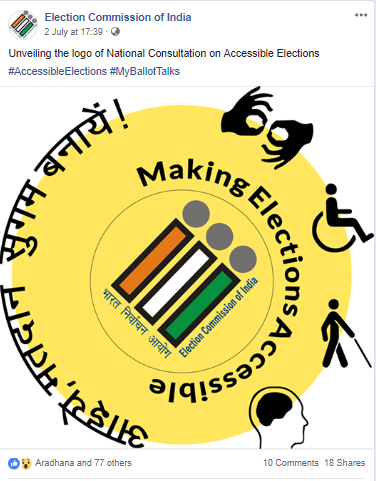
This year’s International Conference of VoICE.NET, organized on the 24th of January, 2018 revolved around the theme of 'Inclusion of PwDs in Electoral Process'. Hon'ble Chief Election Commissioner and the Election Commissioners of India, Dignitaries from five EMBs, Former Chief Election Commissioners of India besides Secretary General, International IDEA, President and CEO,IFES, Experts, Senior Officials and CSO representatives participated in the conference. Prior to this, the Commission's resolve in support of inclusion of PwDs has been conveyed through official directives dated March 12, 2016 and September 7, 2016. (An abstract of action points emanating from these directions is annexed with this issue).
While, a diverse set of real and tangible measures have been adopted in adherence to the directives, it also remains necessary to have a glance at the consolidated picture of outcomes, good practices (including innovations and technological support), existing barriers, how to address those barriers, efficacy and efficiency of the directives in place and further engagement via comprehensive consultation with the stakeholders.
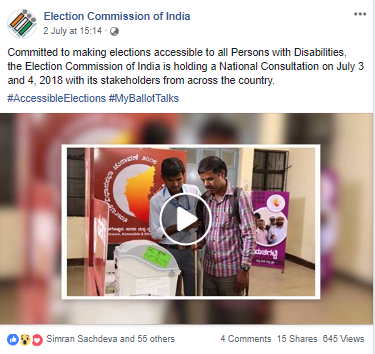
Overall, the State Consultation Reports dealt with aspects including- polling station-wise mapping of PwD electors not registered on the electoral roll, PwD friendly and accessible websites of CEOs/DEOs, specially-abled specific Voter Facilitation Centres, accessible voter awareness resources, special registration and sensitization camps for the concerned electorate, partnering with PwDs as District/State Icons, collaboration with subject-specific NGOs/CSOs, training and sensitization of the election machinery, engagement of volunteers in facilitation-support, accessibility enhancements at the polling station level, appointment of district-level Nodal Officers for PwD Voters, et al.
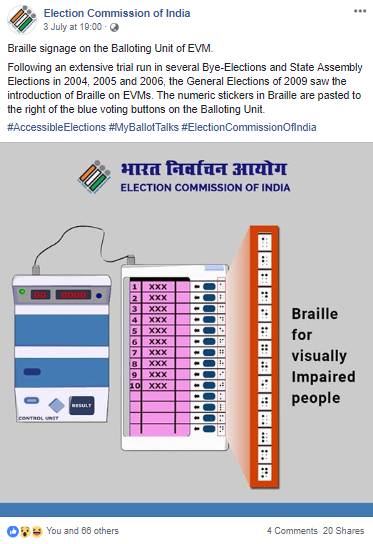
- Accessible registration process including Use of IT
- Accessible Polling Station including EVM/VVPAT and other Facilitation Measures
- Voter Education and Leveraging Partnerships
Furthermore, as a run-up to the State/District Consultations, a thorough mapping of PwDs extending to the level of the Assembly Constituency was also conducted, classifying the concerned electorate into the following 5 categories-
- Electors with Visual Disability
- Electors with Speech and Hearing Disability
- Electors with Locomotors Disability
- Electors with Intellectual Disability
- Electors with Multiple Disabilities
The entire process aided in generating a nationwide data of proven veracity on Persons with Disabilities that is expected to be of vital use in designing accessibility initiatives, developing PwD-friendly communication strategies, making provisions available and rendering requisite amenities targeted right to the polling station level for specially-abled electors.
The National Consultation on Accessible Elections was the culmination of more than 3 month long series of District and State-Level Workshops undertaken as a part of ECI’s theme for 2018- Accessible Elections, to identify barriers in the inclusion of PwDs in the electoral process, assess the present accessibility policies in place and put forward recommendations for addressing barriers to enhance the participation of the differently-abled.
Proceedings of the Consultation
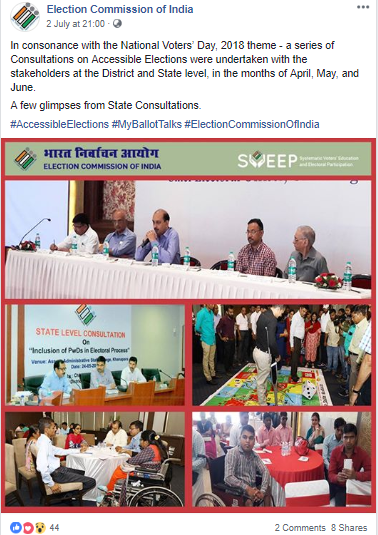
Reaffirming ECI’s commitment to make elections entirely inclusive, accessible and hassle free for PwDs, Chief Election Commissioner Mr O P Rawat said in the inaugural session - “Despite having International, National laws and treaties or procedures in place, there is still a gap in reaching out to PwDs because of the apathy towards electoral process. I urge all the participants to suggest effective measures and help us devise a policy that can serve as a model framework for all Election Management Bodies of the world. Master Ram Chandra, a technician who was instrumental in creating the Jaipur Foot, which is now famous worldwide for providing assistance to PwDs and like him there are many famous as well as unsung heroes who are the part of war against disability.”
In addition to that, Election Commissioner MrAshok Lavasa highlighted the importance of collaboration with stakeholders and society as a whole, while laying emphasis on awareness initiatives and spirit of volunteering among people to make the entire electoral process accessible. Concluding his remarks he said - “More Sensitize we are, More Sensible we become.”
The first day of consultation also witnessed the launch of new dynamic website for ECI’s SVEEP (Systematic Voter’s Education and Electoral Participation) Division with a dedicated section on PwDs and state of the art security and accessibility features.
The first technical session commenced with a presentation by the Department of Empowerment of Persons with Disabilities, Ministry of Social Justice and Empowerment followed by the presentation of Best Practices on Accessible Elections by the Chief Electoral Officers of Karnataka, West Bengal, Gujarat, Himachal Pradesh, Uttarakhand and Meghalaya and District Election Officer of Mandya, Karnataka.
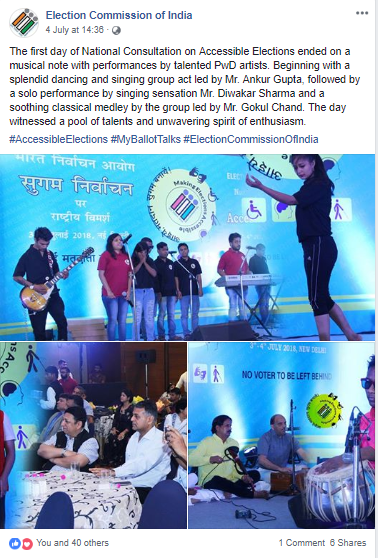
- Group 1: Blindness and Low Vision
- Group 2: Deaf and hard of hearing
- Group 3: Locomotors Disability including cerebral palsy, leprosy cured, dwarfism, acid attack victims of muscular dystrophy
- Group 4: Intellectual disability including autism, specific learning disability and mental illness
- Group 5: Multiple disabilities including deaf-blindness
The groups read through the reports submitted by States/UT and assessed barriers, challenges specific to the disabilities; study existing initiatives, took inputs from the participating CSOs and discuss at length to come out with findings and recommendations for thematic presentations on three different topics namely:
- Accessible Registration Process including use of IT
- Accessible Polling Station including EVM/VVPAT & other Facilitation measures
- Voter Education and leveraging Partnerships
Each group shall give a presentation on all three topics. All the presentations on a specific topic would be summarized by the moderator of the session and presented in the Closing Session to the Commission and senior officials.
Commencing with the 3rd Technical Session, the second day began with group presentations on the theme of ‘Accessible Registration Process including use of Information Technology’. Chaired by Deputy Election Commissioner, Mr Sandeep Saxena and expert panellists including Deputy Election Commissioner Mr Chandra Bhushan Kumar, senior officials from the Ministries of Electronics and Information Technology, delegates of political parties and field experts were there. The major takeaways relating to the subject involved development of accessible websites and mobiles apps for PwDs along with the training and awareness programs for Poll Officials, Political Parties’ candidates and workers on the special needs of PwDs for effective electoral process. Following are the other important points:
- Door step and single visit registration as well as house hold mapping of all persons with disabilities to be carried out for recording the specific facilitations required. Multiple strategies such as cluster registrations and online enrollments may be carried out as well.
- Enrolment and voting rights of persons with intellectual and psycho social disabilities to be clarified at the ground level. Persons affected by Leprosy / leprosy cured to be included within the same enrolment setting and not to be discriminated or excluded by personnel carrying out the enrolment.
- Special attention and accommodation to be given to the mis-match of identification of acid attack victims. Scribes for filling Form 6a for persons with visual impairment to be enabled
- Training and Awareness programs for sensitization of poll machinery specifically BLOs and other officials involved in registration of voters.
- Standard Training Materials to be accessible to all Disabilities : signage, charts, posters, electronic and social media advertisement, short films, involvement of local FM channels (to sensitize family members etc.) and other medium of communication for awareness of the registration process
- Identification and involvement of State and District Level PwD icons or leading CSOs working for the 100% enrollment of disabled, specially deaf and hard of hearing
- ECI to form working group involving different stakeholders towards removing all the barriers faced by persons with disabilities in the electoral process. CSOs empaneled with ECI to be collaborated with DEO offices.
- Well planned communication strategy to be devised and implemented by promoting enrolment (awareness) campaigns inclusive of social media advertisements/short films, providing necessary materials/forms and adapting existing IEC material in accessible formats such as braille, sign language, text to speech conversions, audio visuals, signages, posters/brochures/charts in plain language with pictures and large text etc., accessible web tutorial, IVRS and so on by involving CSOs/institutions working for persons with disabilities.
- CEO’s websites including voter enrollment web page to be made accessible as per standards.
- Accessible mobile apps to be developed for enrolment of electors. The entire process of registration (form 6A) and grievance redress to be made accessible and simple to persons with disabilities including those with intellectual and multiple disabilities/deaf blindness with inbuilt human and technical assistance throughout the process.
- To reach out to all adults with deaf blindness it is essential to include ‘persons with deaf blindness’ specifically along with multiple disabilities in the ECI mapping format. Other initiatives like NSSO survey for Persons with Disabilities currently going on could be another source of required information. Likewise, inclusion of persons with high support needs (intellectual & psycho social disabilities, autism, leprosy, etc.) to be provided targeted intervention.
- An IT enabled tracking system to ensure that persons with disabilities, specifically those with high support needs (such as intellectual/psycho social/multiple disabilities, persons with autism, leprosy affected persons) stay in the loop throughout, and if not participating at any stage, then to identify reasons thereof.
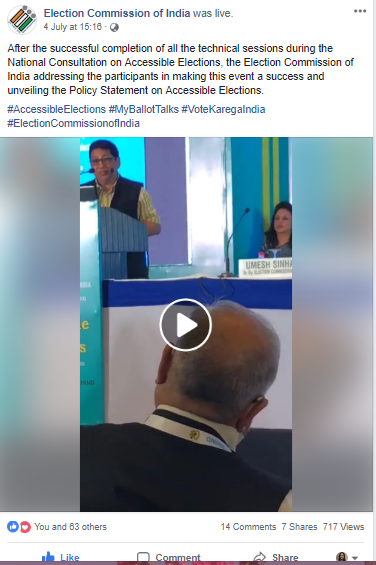
- All photo voter slips of persons with disabilities to be stamped over leaf for priority and assistance. EPIC to have disability identification. Voter slips and voter I-Cards to be prepared in regional braille for voters with visual impairments.
- All instructions at polling stations to be made available in braille, signage, sign language, audio, plain language, and posters with pictures & large text with contrast colors etc.
- Process of voting and usage of EVM /VVPAT to be explained using radio, short films and other awareness materials / activities in large print posters with contrast colors, audio visual / sign language/ plain language/ pictorial chart formats as well as by experiential demonstration.
- Polling booths to be well lit and accessible as per standards. Demarcated parking space, accessible toilets, quality wheel chairs, trained volunteers, assistive aids like magnifiers, small stools, etc. to be made available at polling booths. EVM pulled to reach and parallel reach arrangements to be made for people who have issue in reaching the EVM / top most button.
- Access audits of the polling stations based on standardized checklist to be conducted through trained auditors from public private partnership which need to be followed by corrective actions. Access audit apps can be developed and used.
- Quick orientation about the setup of polling booth & voting compartment with regard to directions, polling officers desks, braille ballot sheet, EVM braille numerals and VVPAT to be provided to a voter with visual impairment.
- Persons affected by Leprosy / leprosy cured to be included within the same polling setting and not to be discriminated or excluded by the polling officers or booth volunteers.
- Audio enabled app to guide persons with disabilities to commute from home to PS and back as well as with other aspects of participating in electoral process to be evolved.
- Transport facility to be provided to voters with disabilities from home to polling booths and back.
- Mobile polling stations to be enabled where there are sizable persons with disabilities. Other alternative voting methods such as postal ballot and online voting may be enabled.
- Development of a standardised training protocol on accessibility and training of election officials including BLOs, polling personnel and voluntary work force to be enforced. The same may include mobility orientation inside the booth, assistance to be provided to voters with disabilities inside and outside polling booth, communication strategies including sign language training and disability etiquettes including terminologies to be used and allowing priority entry at booths, vehicles of persons with disabilities (tricycles) inside the Polling station premises, additional time and / or a companion of their choice in case of voters with low vision, visual /intellectual disabilities or other high support needs.
- Collaboration at all levels with various agencies, departments and CSOs to be worked out to identify barriers and implement remedies.
- Clear cut monitoring system of the entire process to be evolved. Observer’s checklist to include indicators on accessible electoral process. Provision of feedback forms and accessibility evaluations (also by CSOs / third parties) to identify and remedy the existing barriers. Data of voters with disabilities who voted need to be tabulated, gap analysis between actual data of electors with disabilities and those who voted to be carried out and reasons for not voting as well as the issues faced by voters who voted need to be figured out through feedback process.
- Persons with deaf blindness need prior information about polling facility in Braille or tactile sign language either face to face or through website and other online mediums for casting their vote. In case they are not able to move out, facilities like postal ballot or voting from home through mobile voting option may be extended. In case of those who are able to travel, they would need transport facility or accessible route to reach the polling station. The support of sighted guide (usually a family member or friend) is crucial for deaf-blind persons who too need to be informed, aware, educated and empowered. Persons with deaf blindness also need support in becoming familiar with the voting machine and its usage as well as support in choosing the right button to press, in which process, the choice of the voter should be ensured.
- Tactile/ audio aids with head phones/bright visual cues to be made available in/with ballot unit as well as VVPAT. EVM buttons to have sensor that reads out the name of the candidate when touched lightly.
- Online voting method to be explored for people with severe disabilities and those who are on hospitalization.
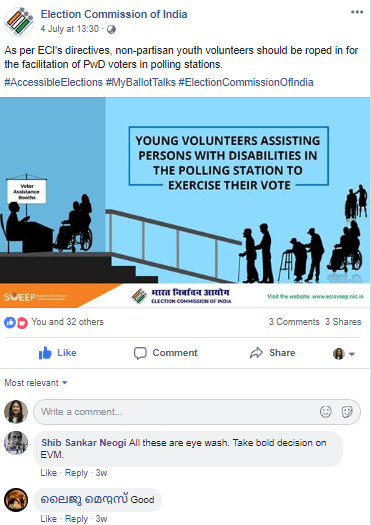
- Instructions & information on election process including contesting candidate details to be provided (preferably in capsules) in braille script, sign language, flow charts, signed audio visuals, readable e- text and other accessible formats. All such information to be provided in accessible web page of CEOs/DEOs as well. For persons with intellectual disabilities, simpler language and shorter sentences shall be used for voter education material.
- Websites of CEOs/DEOs/ECI to be made accessible for all persons with disabilities. All documents, circulars, notifications to be made accessible to scree reader software.
- Targeted training to enhance electoral literacy (capsule courses) in camp mode for persons belonging to different categories of disabilities through various modes such as electoral literacy clubs, mock drills, street plays, short films, games, media, community / cultural events/ adult literacy activities and other accessible exposure and experiential activities. Information on equal electoral rights of persons with leprosy / leprosy cured / TB / HIV Aids, intellectual / psycho social disabilities, autism, multiple disabilities and voters with high support needs to be disseminated to multiple stake holders including election machinery as well as general public.
- Mass reach-out to be administered through multifarious approach such as media, social media, community radio, ICT, street plays, use of disability icons, gram sabha meetings, adult literacy programs, self-help groups, involvement of political parties / community leaders and other reach out initiatives, in accessible venues, means and formats (braille, audio visual, sign language, plain language, posters / brochures with large print, pictures and contrast colours in easy to understand language.)
- National institutes and other ministries / departments to be involved in reaching out to children and persons with disabilities in the community.
- Stakeholders with disability to be involved in every process as volunteers, peer trainers, ambassadors. A list of icons with disabilities to be prepared for each district and AC.
- Public grievance redress mechanism / communication interface with election machinery to be adapted in accessible means and formats.
- To develop web tutorial.
- Sensitivity trainings for all stakeholders, including general public.
- Recognition and incentivization of good practices.
- Setting standards for each leg of election process and compare with actuals to measure success of accessible elections. A task force for setting standards to be set up at central level.
- General and awareness observers to monitor the inclusion of persons with disabilities in voter education and outreach as well.
- Qualitative & Quantitative feedback to be obtained post-election process
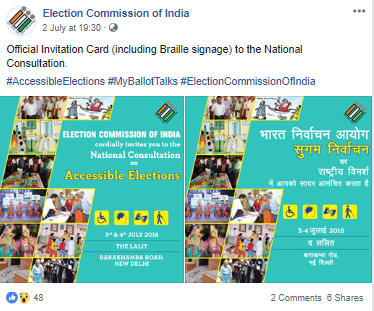
- Printing of EPIC (Electors Photo Identity Card) with Braille for Persons with Visual Impairment or Blind,
- Accessible Communication Awareness Materials
- A Mobile Application to motivate and educate
- Appointment of Disability Coordinators at AC, District and State Level 5. Cascaded training on Accessibility to Poll officials
- Auxiliary Polling Stations
- Accessible Photo Voter Slips
- Sign Language window in all the audio visual training and advertisement content material for the convenience of deaf persons
- Free Transport Facility for PwDs and their Assistants
- A new Accessible Division in India International Institute of Democracy and Electoral Management (IIIDEM), New Delhi
In addition to that, Chief Election Commissioner Mr O P Rawat stated that a review of the program will take place in the next three months. Election Commissioner Mr Sunil Arora said, “We should go far beyond the bureaucratic measures to overcome the barriers. Technology has the capability to fill the gaps and it shall be explored to its fullest potential. Election Commissioner Mr Ashok Lavasa remarked that the set of recommendations received from the Consultation will be examined properly and efforts will be made to implement the same in a time bound manner. The Commission also facilitated two blind voters with Braille enabled EPIC Cards marking the first step towards this initiative.
Launch of Strategic Framework
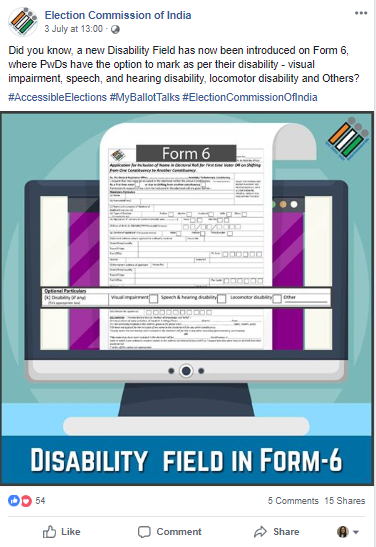
- Barriers: Continuous Identification and Solutions
Identifying barriers and finding solutions to the same has to be a continuous process. A system of regular, periodic feedback shall be taken up. Well-designed approach with strategic interventions including technology integration can help in obliterating barriers. - Voter Registration & Polling
Database on PwDs, identified through mapping or initial voter registration, shall be efficiently and effectively used for follow up steps in the electoral process and the monitoring system for feedback, evaluation and consolidation. Polling stations shall be made accessible to all Persons with disabilities based on mapping of PwD electors and their specific needs. - Inclusive Voter Education
Customised voter education to cater to the different requirements of PwDs shall be taken up to empower them for electoral participation. All voter education content shall be in accessible format. Focussed and need based interventions shall be taken up under ECI’s flagship voter education programme SVEEP to engage PwDs and also to sensitise their friends, families, polling officials, security officials and all other stakeholders. - Leveraging Technology for Accessible Elections
This would essentially include (i) User friendly websites for PwDs of different categories. (ii) Accessible Technological Tools for facilitating PwDs of different categories to cast their vote (iii) Solutions for assisting voters with disabilities through technological innovation, research and integration. (iv) Accessible Media including Social Media Communications. - Research, Study and Knowledge sharing
A continuous search for best practices, international and domestic, through detailed study and research on all areas of participation by PwDs and sharing of experiences to help formulate enabling policies and interventions, to aid, assist and facilitate the participation of PwDs. - Role of Partner Departments
To explore and build partnership and commitment with Ministries and Departments to evolve and carry forward the interventions to facilitate electoral participation of PwDs - Role of Educational Institutions
The Commission has already issued directions for setting up of Electoral Literacy Clubs (ELCs) in educational institutions etc. Setting up of ELCs in educational institutions dedicated to the PwDs shall be expedited and the ELC resources shall be customised to match disability requirements. - Role of CSOs
To assess the potential of CSO’s and assign them specific role in assisting equal access and capacity building through well designed partnerships. CSO’s potential to build partnerships should be utilised subject to their non-partisan nature. - Role of Media
To utilise the potential of media in taking forward voter education and to engage PwDs for increasing their electoral participation. Media can actively contribute to an effective and successful integration of persons with disabilities in the electoral process - Poll Volunteers
Poll volunteers from among future voters can be organised from educational institutions, and Chunav Pathshala, (ELCs for Communities) and trained to assist PwDs, besides from among NCC/NSS/NYKS and other non-partisan voluntary groups. The initiative will be subject to provisions of Rule 49N. - Training and Sensitization of Staff
Training and sensitization of the election staff is important so that they are empathetic to the needs of PwD voters. The training shall be factored into regular training to the staff as also for the registration and facilitation of the PwDs. - Alternative Voting methods
Alternative voting methods like advance voting or early voting, voting from home, Postal vote, transport assistance to PwDs or mobile polling station concept shall be looked at without compromising on the essential requirements of sanctity and secrecy of vote. - Legislative Initiative
The scope of assistance to PwDs for participation is wide and diverse. Need for legislation shall be examined for enhancing electoral participation of the PwDs. - Special 4 tiered Committees on Accessible Elections
Committees shall be formed at National, State, District and Assembly Constituency level with members from departments as well as stakeholders to review implementation of the directions of the Commission on ‘Accessible Elections’.
